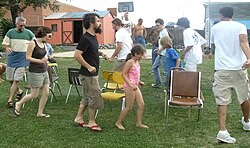| Revision as of 08:10, 24 December 2020 editChongkian (talk | contribs)Autopatrolled, Event coordinators, Extended confirmed users374,682 edits same commons name← Previous edit | Revision as of 15:40, 13 January 2021 edit undoChrisC101 (talk | contribs)1 edit Deleted section about Wales, the game referenced was unique to one event, Wales plays the game as everyone else.Tags: Reverted Visual edit Mobile edit Mobile web editNext edit → | ||
| Line 21: | Line 21: | ||
| == Gameplay == | == Gameplay == | ||
| A set of chairs is arranged in a circle with one fewer chair than the number of players (i.e. seven players, six chairs). The players then move around the set of chairs as music plays. When the music stops, all players must sit on the chairs and whichever player fails to sit on a chair or find one in the set is eliminated. One chair is then removed and the process repeated until only one player remains and is declared the winner. | A set of chairs is arranged in a circle with one fewer chair than the number of players (i.e. seven players, six chairs). The players then move around the set of chairs as music plays. When the music stops, all players must sit on the chairs and whichever player fails to sit on a chair or find one in the set is eliminated. One chair is then removed and the process repeated until only one player remains and is declared the winner. | ||
| In ], musical chairs had a similar custom to the modern version, with slight differences; the boys would always sit whilst the girls would skip around, always outnumbering the boys, if the a girl didn't sit fast enough on the boy's lap, she would have to forfeit, this would continue until the end when the winning girl would kiss the last boy on the cheek.<ref>https://player.bfi.org.uk/free/film/watch-dymar-urdd-1975-online</ref> | |||
| == History of the name == | == History of the name == | ||
Revision as of 15:40, 13 January 2021
Party game "Trip to Jerusalem" redirects here. For the public house in Nottingham, see Ye Olde Trip to Jerusalem. For other uses, see Musical chairs (disambiguation).| This article does not cite any sources. Please help improve this article by adding citations to reliable sources. Unsourced material may be challenged and removed. Find sources: "Musical chairs" – news · newspapers · books · scholar · JSTOR (July 2017) (Learn how and when to remove this message) |
Musical chairs, also known as Trip to Jerusalem, is a game of elimination involving players, chairs, and music. It is a staple of many parties worldwide.
Gameplay
A set of chairs is arranged in a circle with one fewer chair than the number of players (i.e. seven players, six chairs). The players then move around the set of chairs as music plays. When the music stops, all players must sit on the chairs and whichever player fails to sit on a chair or find one in the set is eliminated. One chair is then removed and the process repeated until only one player remains and is declared the winner.
History of the name
The origins of the game's name, Trip to Jerusalem, is disputed. However, it is known to come from its German name "Reise Nach Jerusalem" (lit. The Journey to Jerusalem). One theory suggests that the name was inspired by the Crusades, wherein several heavy losses were incurred. Another theory suggests that it was inspired by the Aliyah, the immigration of Jews from the diaspora to the Land of Israel historically, which today includes the modern State of Israel, wherein it is stated that spaces on ships taking the Jews to the said land were limited. None of these theories were officially confirmed.
As metaphor
The term "playing musical chairs" is also a metaphor for describing any activity where items or people are repeatedly and usually pointlessly shuffled among various locations or positions. It can also refer to a condition where people have to expend time searching for a resource, such as having to travel from one gasoline station to another when there is a shortage. It may also refer to political situations where one leader replaces another, only to be rapidly replaced due to the instability of the governing system (see cabinet shuffle).
In the musical Evita, during the song "The Art of the Possible", Juan Perón and a group of other military officers play a game of musical chairs which Perón wins, symbolizing his rise to power.
See also
References
| Party games | |
|---|---|
| Guessing games | |
| Other games | |
